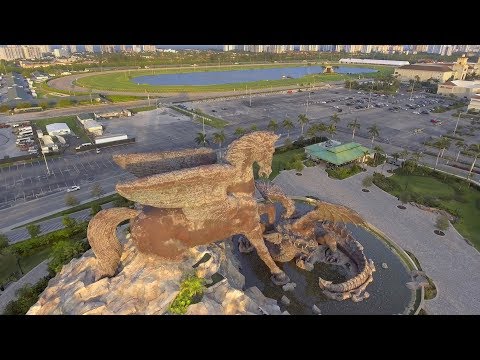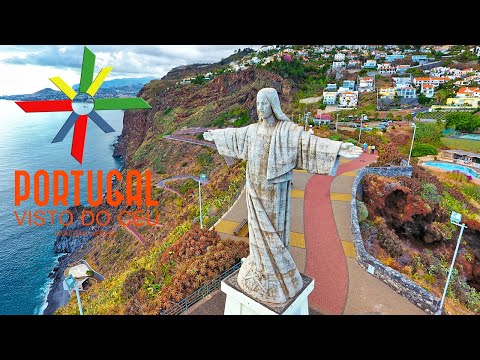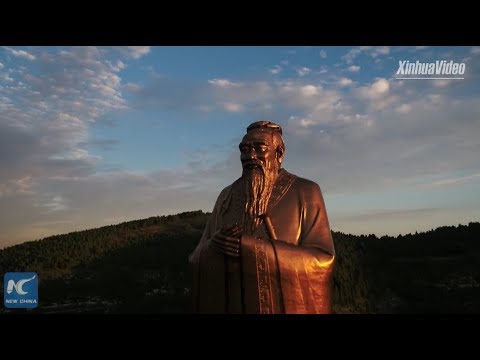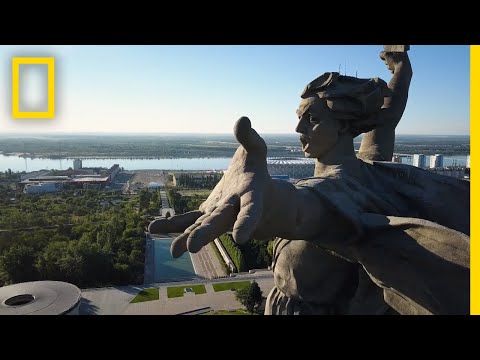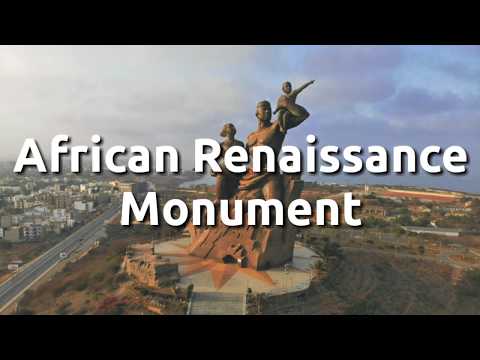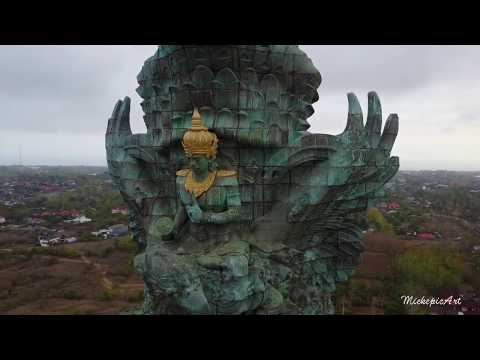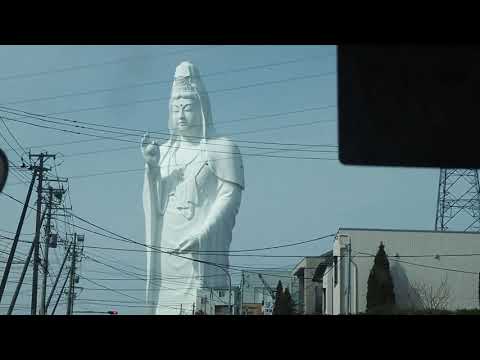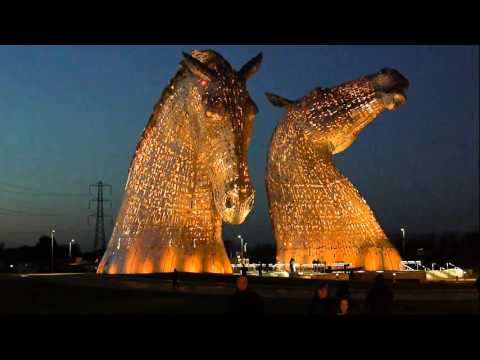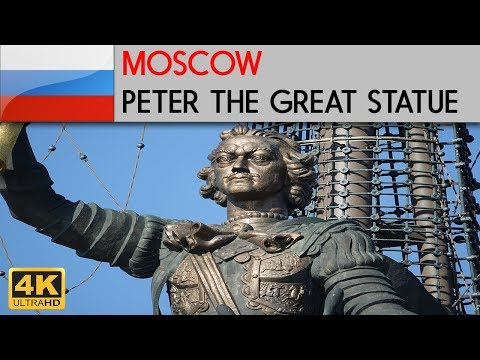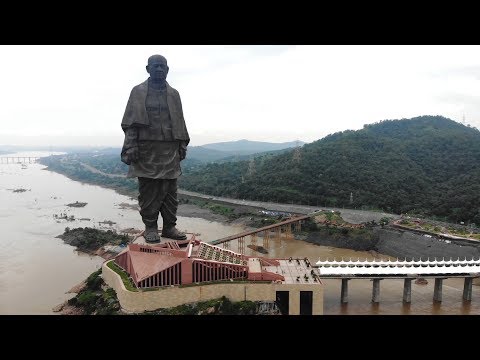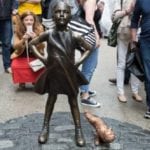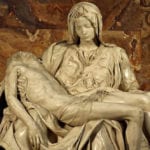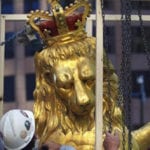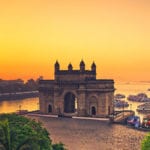10 Pegasus and Dragon
Thousands of horses have trotted through history, playing a pivotal role in transportation, city development, medical breakthroughs, and warfare. Up until the final battle of WWII, horses were used to pull heavy artillery, transport supplies, and carry brave soldiers onto the battlefield. During the Middle Ages they were trusty steeds to knights. Henry II would not have been able to travel the more than 400 miles to a battle, if not for horses. To this day, some farmers still use horses to work their land. In 2011 founder of the Stronach Group, Frank Stronach, sketched a rough idea of what he envisioned a massive horse statue should look like. Five years later, his vision came to fruition in the form of the 100-foot-tall Pegasus and Dragon statue located on the northside of Gulfstream Park in Hallandale Beach, Florida. The bronze statue is the largest horse sculpture in the world and was erected in honor of all the horses that made unforgettable contributions to human civilization. This stunning piece of art depicts Pegasus standing over a fallen dragon and took two years to build.
9 Cristo Rei
The British did not seek assistance from Portugal during WWII, which meant that Portugal could remain neutral for the duration of the war. The country remained neutral until 1944, when the US established a military base in Santa Maria. In May 1959, the 360-foot Cristo Rei statue was inaugurated and has looked over the city of Lisbon ever since. The Cardinal Patriarch of Lisbon had visited the Christ the Redeemer statue in Brazil many years before and this experience served as inspiration for the Portugal statue. It was expressly erected in gratitude because Portugal had been spared the horrors of the Second World War. The arches of the monument, supporting the hand-sculpted statue of Christ, face each of the four cardinal directions and is illuminated at night.
8 Confucius of Mount Ni
Confucius is considered to be one of China’s most influential philosophers. He was the founder of Confucianism and believed that rulers needed to be at the forefront of ethical behavior and lead by example. Traditionally it is believed that Confucius was born in a cave on Mount Ni, which is a hill 19 miles southeast of Qufu in Shandong Province, China. According to mythology it is here that Confucius’ mother abandoned him for some time, and he was looked after by a tiger and an eagle. Mount Ni is also the location of a 236-foot brass statue of Confucius which was unveiled in 2018. It is the largest Confucius statue in the world, and it is hoped that the monument will help promote traditional Chinese culture.
7 The Motherland Calls
The Motherland Calls statue towers over the city of Volgograd in Russia. It is the tallest statue in Europe, the tallest statue of a woman in the world and the sword in her hand is also the largest in the world. The sculpture is a depiction of a courageous woman stretching her left arm before her while wielding the sword with the right. She symbolizes the call from the Motherland to never surrender in battle and keep defending the land until all enemies are vanquished. The 279-foot statue was built in 1967 in commemoration of 25 years since the Battle of Stalingrad (today’s Volgograd). The battle was one of the bloodiest in human history and cost the lives of almost 2 million soldiers. Stalingrad was completely rebuilt after the war and there are mass graves scattered throughout modern-day Volgograd. Buried in the surrounding area of the statue is Vasily Zaytsev, a Soviet sniper, as well as Ivanovich Chuikov, Marshal of the Soviet Union.
6 African Renaissance Monument
In 2010 then president of Senegal, Abdoulaye Wade, unveiled Africa’s tallest statue: the African Renaissance Monument. The 160-foot bronze statue was meant to be a proud symbol of African liberation and to entice tourists to explore the country. It officially commemorates the 50th anniversary of Senegal’s independence from France. The sculpture depicts a strong man holding a small, nude child in one arm with the other wrapped around a scantily clad woman. However, in a predominantly Muslim community, the concept of idolatry and the nudity displayed did not go over well. Add to that the fact that almost half of the country’s population lives below the poverty line and that $27 million was spent on the statue alone, understandable outrage ensued. As construction went on, it wasn’t uncommon to see heaps of rubbish at the base of the hill the statue now stands on. Unfinished homes dotted the area surrounding the monument. Defending the monument, Wade revealed that he didn’t pay the full amount because he had made a deal with a North Korean state-owned construction company to build the statue in exchange for around 40 acres of prime Senegal real estate.
5 Garuda Wisnu Kencana
In 1990, Indonesian sculptor, Nyoman Nuarta was inspired to come up with the design of a statue depicting Hindu deity Vishnu astride the mythical bird, Garuda. Construction began in Bali in 1997 but setback after setback led to the project only being completed in 2018. The total cost came to around $100 million. The copper and steel statue is very impressive, standing at 246-feet tall with Vishnu sporting a crown covered in gold-plated mosaics and weighing 3.5 tons. An architectural lighting solution was incorporated to enhance the finer details of the tallest statue in Indonesia. The myth behind the inspiration of the statue’s design tells the story of the search of Amrita (the elixir of life). It is said that Garuda agreed to be Lord Vishnu’s mode of transport if in turn he could use the elixir to free his enslaved mother.
4 Sendai Daikannon
Sendai Daikannon is a mammoth of a statue that overlooks the city of Sendai in the Tohoku region of Japan. It was once the tallest statue in the world, but today ranks in 5th place. The 328-foot sculpture represents a goddess of mercy who holds a wishing gem in one hand and a water flask in the other. At the entrance on the ground floor are 33 kannon statues that each represent the different forms that the kannon goddess can transform into. Across from these are more statues, but they depict demonic creatures that each represent a month in Chinese astrology. Visitors can take an elevator to the top of the statue and walk back down using a stairwell. As they descent they will pass 108 Buddhist statues that represent emotions and desires. Should a visitor want to rid themselves of any negative emotion, they should find the appropriate statue, make a wish, and leave a donation.
3 The Kelpies
Kelpies are shapeshifting aquatic beings of Scottish legend. They are rumored to haunt waterways such as rivers and streams and appear to humans in the form of a horse or pony. They are evil however, causing humans and especially children who happen to get on their back to be permanently stuck to their hide. They then drag their unfortunate victims into the nearby water and proceed to eat them. In 2013, two 100-foot-tall horse-head statues were unveiled between Falkirk and Grangemouth in Scotland. They were opened to the public in 2014 which was also the Lunar Year of the Horse. The sculptures, known as The Kelpies, are the biggest equine sculptures in the world and the tallest in Scotland. They form a gateway at the eastern entrance to the Forth and Clyde canal and are a monument to the horse-powered heritage of the country.
2 Peter the Great
In tribute to the Russian leader, Peter the Great, a massive 322-feet statue of the czar stands atop a tower of ships in Moscow. Unfortunately, it hasn’t won any prizes for design and many Moscow locals are of the opinion that it is one of the ugliest statues in the world and an eyesore for the city. A rumor that doesn’t help matters much says that the statue, erected in 1997, wasn’t originally intended to honor Peter the Great but was instead created in homage to Christopher Columbus to commemorate the 500th anniversary of his first voyage. When a buyer couldn’t be found for the statue, some details were reworked so that it would represent the 300th anniversary of the Russian Navy founded by Peter the Great. Also, the czar wasn’t a fan of Moscow at all, to the extent that he moved the capital of Russia to Saint Petersburg. Because Moscow’s residents don’t seem to be warming up to his statue, it has been suggested that it should be moved to Saint Petersburg. The people of Saint Petersburg, however, does not seem to be very interested in sporting the huge monument within the borders of their city either.
1 Statue of Unity
The colossal Statue of Unity depicts Indian statesman Vallabhbhai Patel. He was the highly respected first Deputy Prime Minister and Home Minister of India and is credited for forming the single Union of India. The statue stands in Gujarat, India and is the tallest statue in the world reaching 597 feet in height. The statue can withstand strong winds of up to 180km per hour and earthquakes measuring up to 6.5 on the Richter scale. It was constructed in 33 months and inaugurated in 2018. Inside the legs are four lifts that can transport visitors to the top in 30 seconds, and much like the Statue of Liberty, this monument will turn green around 100 years from now. It is about 4 times taller than Lady Liberty, however. There has also been controversy surrounding the project, since 185 families including farming families had to be relocated to make way for the huge statue. They were compensated with 475 hectares of new land, but this didn’t stop protests from erupting. Read More: Mary and Me
